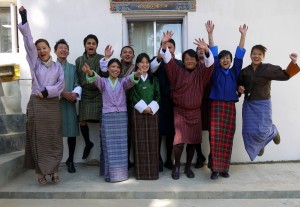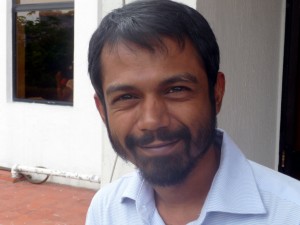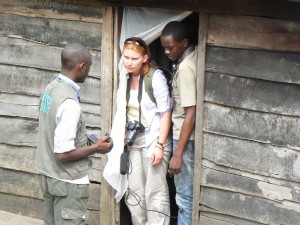Search Results for Tag: TV
East4South: Communication, coordination and cameras
As you may have read in earlier posts East4South is a unique journalism project that enables African journalists to research and produce stories with journalists from Eastern European countries.
Ten African journalists recently teamed up with ten Eastern European journalists for the third cycle of the East4South. The European journalists travelled through the home country of their African partner to research stories. Then together they produce their stories at the DW Akademie in Bonn.
The latest group brought back materials to produce a diverse range of stories from milk farming in South Africa, the struggles of Congolese female politicians to the glitz of Nigeria’s Nollywood, the world’s second largest film-making industry.
![]() read more
read more
Getting everyone up to speed in a converged Himalayan newsroom
 Even high in the Himalayas, reporters these days are being asked to do more.
Even high in the Himalayas, reporters these days are being asked to do more.
As part of a modernization drive, Bhutan Broadcasting Service (BBS) has combined their radio and television newsrooms. In the future, reporters will be required to provide news reports in both media. It’s hoped that the convergence will allow the state-funded station to cut costs and do more with limited resources.
It was against this background that two DW-AKADEMIE trainers went to Bhutan’s high-altitude capital Thimphu to conduct a workshop with an enthusiastic group of 12 young BBS journalists. While several already had some radio production experience, many had previously only worked on the TV side of things.
Together, the group started with a review of the basics, such as news judgment and news writing for radio, before moving on to the interview and how to ask that all-important first question that will grab your listeners and keep them from turning the dial.
![]() read more
read more
Eastern Europe meets Africa
 Take young journalists from Eastern European countries, bring them together with experienced journalists from Africa and give them the chance to produce stories together. That’s East4South in a nutshell but it’s an interesting media project on many levels.
Take young journalists from Eastern European countries, bring them together with experienced journalists from Africa and give them the chance to produce stories together. That’s East4South in a nutshell but it’s an interesting media project on many levels.
The journalists first meet for an initial workshop in Brussels. Here, they discuss their perceptions of each others country and examine intercultural reporting. And, importantly everybody finds a team partner for the reporting trip in Africa.
After one week in Brussels, the participants go back to their respective homes to get ready for the big project. About three months later each team meets in the home country of the African partner and begins producing their TV features, radio reports or articles.
Two participants really clicked together. Christian Katsuve Kamate is from DRC and works for a local radio station in Bukavu. He teamed up with Katarzyna J. Kowalska who is from Poland and works for Polish national television. After their first meeting in Brussels they agreed on a topic for a film: the life of an ex-child soldier, moreover – a female child soldier. For both of them, the work experience left a lasting impression. We caught up with them during their post-production at DW’s studios in Bonn.
![]() read more
read more
An inside look at Bhutan’s first TV program for kids
Thinley Yangchen Dorji, a producer at the Bhutan Broadcasting Service Corporation (BBS), takes us on a tour behind the scenes of Bhutan’s first homegrown TV show for kids. Called “My World”, it’s a 30-minute program for youngsters aged eight to twelve that began airing regularly in January. Welcome to “My World”!
Prior to “My World” there were no Bhutanese television programs for children. Foreign programming available via satellite was entertaining but had little educational value. Pema Choden, BBS’s General Director until the end of March 2011, approached DW-AKADEMIE for support. Her aim was to have a quality program tailored to children in Bhutan.
![]() read more
read more
Japan through the news lens of Bangladesh
By Taufique Ahmed, Dhaka, Bangladesh
 Bangladesh is shocked by what has happened in Japan. People here have closely followed the news to get the latest updates from newspapers, TV, radio and online.
Bangladesh is shocked by what has happened in Japan. People here have closely followed the news to get the latest updates from newspapers, TV, radio and online.
It’s very tough for the media to handle what’s happening in Japan, as there is also another big issue that the people of Bangladesh worry about very much. Many people here are still taken aback by the latest events in Libya, because many Bangladeshis live and work there and have now become victims of the uprising in this North African country.
Japan's tsunami and earthquake are still important news in Bangladesh, as this country is also one of the sufferers of climate change. Nonetheless, Japan's nuclear crisis is also getting attention in the newspapers and at TV and radio stations here as the situation worsens.
![]() read more
read more










Feedback